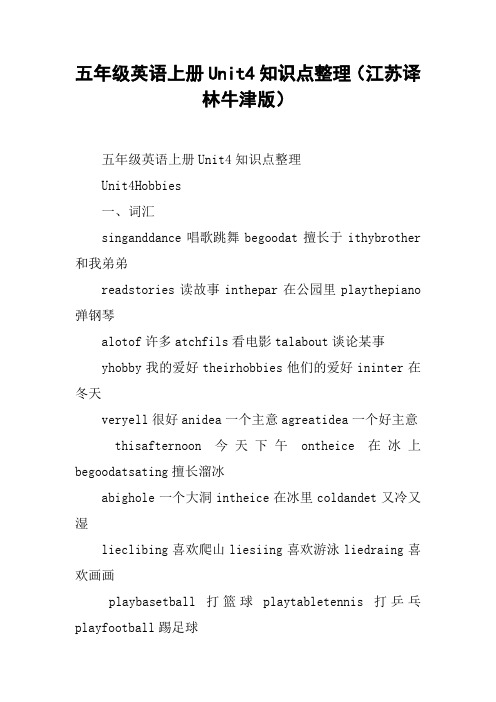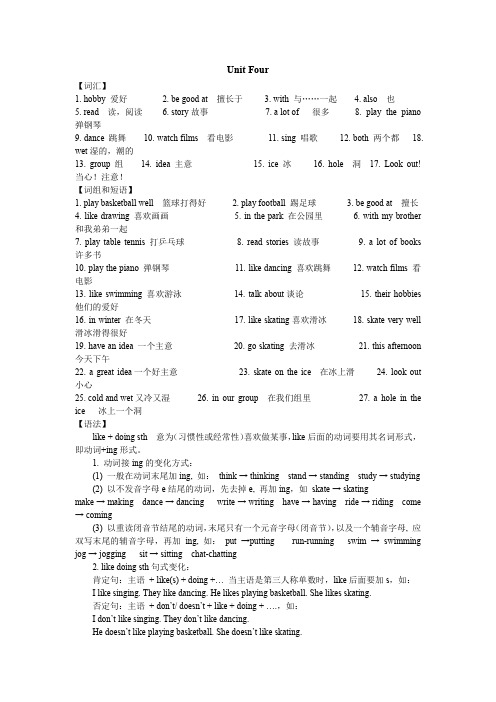江苏译林版五年级上册Unit4 第四单元知识点归纳总结
- 格式:docx
- 大小:13.40 KB
- 文档页数:2

五年级英语上册Unit4知识点整理(江苏译林牛津版)五年级英语上册Unit4知识点整理Unit4Hobbies一、词汇singanddance唱歌跳舞begoodat擅长于ithybrother 和我弟弟readstories读故事inthepar在公园里playthepiano 弹钢琴alotof许多atchfils看电影talabout谈论某事yhobby我的爱好theirhobbies他们的爱好ininter在冬天veryell很好anidea一个主意agreatidea一个好主意thisafternoon今天下午ontheice在冰上begoodatsating擅长溜冰abighole一个大洞intheice在冰里coldandet又冷又湿lieclibing喜欢爬山liesiing喜欢游泳liedraing喜欢画画playbasetball打篮球playtabletennis打乒乓playfootball踢足球二、句型hatdoyouliedoing?你喜欢干什么?Ilieplayingbasetballandfootball.我喜欢打篮球和踢足球。
Icanplaybasetballell,butI’notgoodatfootball.我篮球打得很好,但我不擅长足球。
Heliesplayingfootballtoo.他也喜欢踢足球。
Shealsoliesplayingthepiano.她也喜欢弹钢琴。
Theybothliesiing.她们都喜欢游泳。
hatdoesheliedoing?他喜欢干什么?Heliesdraing.他喜欢画画。
hatdoessheliedoing?她喜欢干什么?Sheliesreadingstories.她喜欢读故事。
hatdotheyliedoing?她们喜欢干什么?Theylieatchingfils.她们喜欢看电影。
SaandBillytalingabouttheirhobbies.山姆和比利谈论他们的爱好。

Unit 4 Hobbies一、单词1.hobby 爱好 5. piano 钢琴9. both (两者)都13. ice 冰2.dance 跳舞 6. film 电影10. All (三者及以上)都14. hole 洞3.draw 画间7. also 也11. climb 精爬15.wet 湿的4.read 读,阅读8. with 和…一起12. group 组16. idea 主意二、词组1. my hobby 我的爱好2. talk about their hobbies 谈论他们的爱好3. play football 踢足球4. play basketball well 打篮球打的好5. draw in the park 在公园画画6. with my brother 和我弟弟在一起7. be good at football 擅长足球8.be good at singing 擅长唱歌9. play table tennis 打乒乓球10. play the piano 弹钢琴11. read stories 读故事12. watch films 看电影13. like dancing 喜欢跳舞14. like climbing 喜欢攀爬15. be good at skating 擅长溜冰16. cold and wet 又冷又湿17. have an idea 有一个主意18. a hole in the ice 在冰里的一个洞19. look out=be careful 小心20. like...very much 非常喜欢…21. a lot of books=lots of books 许多书22.in our group 在我们的组里三、句型1.----What do you like doing? ----你喜欢做什么?----I like drawing. ----我喜欢画画。

五年级英语上册Unit 4知识点整理(江苏译林牛津版)五年级英语上册Unit4知识点整理(江苏译林牛津版)Unit4Hbbies一、词汇singanddane唱歌跳舞begdat擅长于ithbrther和我弟弟readstries读故事inthepar在公园里plathepian弹钢琴altf许多athfils看电影talabut谈论某事hbb我的爱好theirhbbies他们的爱好ininter在冬天verell很好anidea一个主意agreatidea一个好主意thisafternn今天下午ntheie在冰上begdatsating擅长溜冰abighle一个大洞intheie在冰里ldandet又冷又湿lielibing喜欢爬山liesiing喜欢游泳liedraing喜欢画画plabasetball打篮球platabletennis打乒乓plaftball踢足球二、句型hatdulieding?你喜欢干什么?Ilieplaingbasetballandftball我喜欢打篮球和踢足球。
2Ianplabasetballell,butI’ntgdatftball我篮球打得很好,但我不擅长足球。
3Heliesplaingftballt他也喜欢踢足球。
4Shealsliesplaingthepian她也喜欢弹钢琴。
Thebthliesiing她们都喜欢游泳。
6hatdeshelieding?他喜欢干什么?Heliesdraing他喜欢画画。
7hatdesshelieding?她喜欢干什么?Sheliesreadingstries她喜欢读故事。
8hatdthelieding?她们喜欢干什么?Thelieathingfils她们喜欢看电影。
9SaandBilltalingabuttheirhbbies山姆和比利谈论他们的爱好。
0Let’sgsatingthisafternn咱们今天下午去滑冰。
1Lut!小心!2Thereisahleintheie冰里有一个洞。

知识点归纳五年级上册英语知识素材Unit4Hobbies单元知识点译林版三起Unit 4: HobbiesIn Unit 4, we will be learning about hobbies. Hobbies are activities that we enjoy doing during our free time. They can be a great way to relax, have fun, and learn new skills. Let's dive into the knowledge points covered in this unit.1. VocabularyIn this unit, we will be introduced to various hobbies and leisure activities. Here are some key vocabulary words related to hobbies:- Painting: the act of creating art using paint and a brush- Dancing: moving the body rhythmically to music- Swimming: the activity of moving through water by using arms and legs- Reading: the activity of understanding written words and sentences- Singing: producing musical sounds with the voice- Playing an instrument: making music using a musical instrument, such as a guitar or piano2. Expressing Likes and DislikesWe will also learn how to express our likes and dislikes towards different hobbies. Here are some helpful phrases:- I like swimming.- He dislikes painting.- We love playing instruments.It's important to note that when expressing dislikes, we can use "don't like" or "dislike" before the hobby, while "love" and "like" can be used interchangeably to express likes.3. GrammarIn this unit, we will learn about the present simple tense and how to use it to talk about hobbies. Here is a brief overview:- Positive sentence: Subject + verb (base form) + object- Example: She plays the piano.- Negative sentence: Subject + do/does + not + verb (base form) + object- Example: They do not like swimming.- Question sentence: Do/Does + subject + verb (base form) + object?- Example: Do you enjoy reading?4. Dialogue PracticeTo practice using the vocabulary and grammar we have learned, we will engage in dialogues with our classmates. These dialogues will focus on talking about hobbies, asking and answering questions about likes and dislikes, and expressing opinions.Sample Dialogue:A: What's your favorite hobby?B: I love dancing. How about you?A: I enjoy reading. Do you play any instruments?B: Yes, I play the guitar and the piano.Through these dialogues, we can improve our speaking and listening skills while also reinforcing the new vocabulary and grammar rules.5. Cultural InsightsIn this unit, there might also be some cultural insights related to different hobbies. For example, we may learn about traditional dances from various countries or famous painters from history. Such insights can help broaden our knowledge and understanding of different cultures.ConclusionUnit 4 focuses on introducing us to the world of hobbies. By learning new vocabulary, grammar rules, and engaging in dialogues, we can expand our language skills while exploring activities we enjoy. From painting to playing instruments, let's embrace the joy of hobbies and continue to learn and grow.。

Unit Four【词汇】1. hobby 爱好2. be good at 擅长于3. with 与……一起4. also 也5. read 读,阅读6. story故事7. a lot of 很多8. play the piano 弹钢琴9. dance 跳舞10. watch films 看电影11. sing 唱歌12. both 两个都18. wet湿的,潮的13. group 组14. idea 主意15. ice 冰16. hole 洞17. Look out! 当心!注意!【词组和短语】1. play basketball well 篮球打得好2. play football 踢足球3. be good at 擅长4. like drawing 喜欢画画5. in the park 在公园里6. with my brother 和我弟弟一起7. play table tennis 打乒乓球8. read stories 读故事9. a lot of books 许多书10. play the piano 弹钢琴11. like dancing 喜欢跳舞12. watch films 看电影13. like swimming 喜欢游泳14. talk about谈论15. their hobbies 他们的爱好16. in winter 在冬天17. like skating喜欢滑冰18. skate very well 滑冰滑得很好19. have an idea 一个主意20. go skating 去滑冰21. this afternoon 今天下午22. a great idea一个好主意23. skate on the ice 在冰上滑24. look out 小心25. cold and wet又冷又湿26. in our group 在我们组里27. a hole in the ice 冰上一个洞【语法】like + doing sth 意为(习惯性或经常性)喜欢做某事,like后面的动词要用其名词形式,即动词+ing形式。

译林版五年级上册第四单元一、单词部分。
1. 重点单词。
- 列出本单元需要重点掌握的单词,如:- animal(动物):注意其复数形式animals的拼写和读音。
- have(有):第三人称单数形式has的用法要重点理解。
- cute(可爱的):可拓展近义词lovely。
2. 单词记忆方法。
- 联想记忆:例如,对于单词“panda”(熊猫),可以联想熊猫黑白相间的外貌、爱吃竹子等特点来记忆。
- 分类记忆:将动物类单词放在一起记忆,如“cat”(猫)、“dog”(狗)、“elephant”(大象)等。
二、句型部分。
1. 重点句型。
- 描述动物特征的句型:It is...(它是……),例如:It is big and strong.(它又大又强壮。
)- 表达某人拥有某物的句型:I/He/She has...(我/他/她有……),如:She has a pet cat.(她有一只宠物猫。
)2. 句型练习。
- 进行句型转换练习,如将肯定句改为否定句或疑问句。
例如:He has a dog. 否定句:He doesn't have a dog. 疑问句:Does he have a dog?- 情景对话练习:创设在动物园或者谈论宠物的情景,运用本单元句型进行对话。
三、语法部分。
1. 一般现在时(第三人称单数)- 解释第三人称单数(he/she/it等)作主语时,动词的变化规则。
例如:在一般现在时中,动词have变为has。
- 举例说明在句子中的正确用法,如:The dog likes bones.(like变为likes)2. 形容词的用法。
- 形容词用于描述名词的特征,通常放在be动词后面或者名词前面。
例如:a cute rabbit(一只可爱的兔子),The rabbit is white.(兔子是白色的)四、课文部分。
1. 课文理解。
- 概括课文的主要内容,如课文是围绕动物园里的动物展开的,介绍了不同动物的外貌、习性等。
Unit 4语音:字母y在单词的最前面,y发辅音/j/:year your yellow yes you young yeah单词及发音read /ri:d/ 读,阅读story/’stɔ:ri/ 故事dance /da:ns/ 跳舞sing /siŋ/ 唱歌hobby /’hɔbi/ 爱好(hobbies)with /wið/ 和……一起also/’ɔ:lsəu/ 也both /bəuθ/ (两者)都group /gru:p/ 组about /ə’baut/ 关于idea /ai’diə/ 主意ice /ais/ 冰hole /həul/ 洞wet /wet/ 湿的(反义词dry)piano /pi’ænəu/ 钢琴all /ɔ:l/ 都词组归纳1. be good at 擅长(反义词be weak in)2. a lot of =lots of=many 许多3. play basketball well 打篮球打得好4. be good at football 擅长(踢)足球5. with my brother 和我弟弟一起6. sing and dance 唱歌跳舞7. like playing football 喜欢踢足球8. like playing table tennis 喜欢打乒乓球9. like dancing 喜欢跳舞10. read stories 读故事11. have a lot of books 有许多书12. like reading books 喜欢读书13. like singing 喜欢唱歌14. both like swimming 两者都喜欢游泳15. draw in the park 在公园里画画16. skate very well 溜冰溜得很棒17. play the piano 弹钢琴18. watch films 看电影19. they both like 他们都喜欢20. also like 也喜欢21. in our groups 在我们组里22. like wearing yellow 喜欢穿黄色衣服23. have yellow shoes 有黄色的鞋子24. like climbing 喜欢爬山25. talk about their hobbies 谈论他们的爱好26. have an idea 有个主意27. a great idea 一个很棒的主意28. skate on the ice 在冰上溜冰29. be really good at skating 真的擅长溜冰30. a hole in the ice 冰里的一个洞31. look out = be careful 小心32. cold and wet 又冷又湿33. your friends’ hobbies 你朋友们的爱好34. like doing sth. 喜欢做某事句型1. I like playing basketball and football. 我喜欢打篮球和踢足球。
Unit 4 Hobbies(含答案)重难点讲解(含答案)一、重难点讲解1.I like playing basketball and football. 我喜欢打篮球和踢足球。
解析:like 意为“喜欢”,后接doing sth,表示“(习惯性)喜欢做某事”。
【例句】(1) I like sitting on the swing. 我喜欢坐在秋千上。
(2) Paul likes watching basketball games. 保罗喜欢看篮球比赛。
【练习】用所给单词的适当形式填空。
(1) I like (sing) and (dance).(2) Tom (like) (play) with his model planes.【答案】(1) singing, dancing (2) likes, playing2.I can play basketball well, but I am not good at football.我打篮球能打得好,但是我不擅长(踢)足球。
解析:本句中的well为副词,意为“好”,一般用于动词后修饰动词。
be good at意为“擅长于”,后接名词、代词或动名词,相当于do well in(后接名词、代词或动名词)。
【例句】(1) Mr Jones can fly kites well. 琼斯先生放风筝可以放得很好。
(2) Mike is good at(playing) table tennis.=Mike does well in(playing) table tennis.迈克擅长打乒乓球。
【练习】用所给单词的适当形式填空。
(1) Tracy's sister is very young, but she's good at (swim).(2) They're painters. They can draw pictures (good).【答案】(1) swimming (2) well3.He also likes playing table tennis. 他也喜欢打乒乓球。
五年级上册第四单元译林版英语知识点总结本文档将总结五年级上册第四单元译林版英语的知识点。
以下是重要的知识点和要点:1. 词汇:掌握以下单词的拼写和意义:- Unit 4: apple, banana, cherry, grape, lemon, orange, peach, pear, strawberry, watermelon2. 句型:掌握以下句型的用法:- I like [fruit].(我喜欢[水果]。
)- Do you like [fruit]?(你喜欢[水果]吗?)- Yes, I do. / No, I don't.(是的,我喜欢。
/ 不,我不喜欢。
)- What fruit do you like?(你喜欢哪种水果?)- I like [fruit] best.(我最喜欢[水果]。
)- How about you?(你呢?)3. 语法:了解以下语法知识:- 形容词最高级:用于表示三个或以上事物之间的比较,形式为"the + 形容词的最高级 + 名词"。
- 例如:I like strawberries best.(我最喜欢草莓。
)4. 对话:参考以下对话,掌握正确的表达方式:- A: What fruit do you like?B: I like apples.A: Do you like bananas?B: No, I don't.5. 口语练:尝试与同学或家人进行以下口语练,以提高口语表达能力:- A: What fruit do you like best?B: I like watermelons best. How about you?A: I like oranges best.以上是五年级上册第四单元译林版英语的知识点总结。
请同学们复并掌握这些内容,以提高英语水平。
(注:本文档的内容来自译林版五年级上册英语教材,内容真实可信。
Uni t 4 Hobbies 知识点第一次作业:一单词1.hobby 爱好2.wi t h 与……一起3.also也4.read 读,阅读5.s t ory故事6. usually 通常7. group 组8.bo t h两个二、词组1. play baske t ball 打篮球2. play foo t ball踢足球3. play t he piano 弹钢琴4.play t able t ennis 打乒乓球5. wa t ch films 看电影6. be good a t擅长于……7.a lo t of books 许多书8.like reading s t ories 喜欢读故事9. bo t h like singing两个都喜欢唱歌10. wi t h my bro t her 和我弟弟一起三、句子1. He likes playing foo t ball t oo.他也喜欢踢足球。
2.T hey bo t h like swimming. 他们两个都喜欢游泳。
第二次作业:一、词组1. like drawing 喜欢画画2. like dancing 喜欢跳舞3. like ska t ing喜欢溜冰4. like swimming 喜欢游泳5. in our group 在我们组里6.wear yellow穿黄色的衣服7. your friends' hobbies 你的朋友们的爱好二、句子1. I like playing baske t ball and foo t ball.我喜欢打篮球和踢足球。
2. Wha t does she like doing?She likes reading s t ories. 她喜欢做什么?她喜欢读故事。
3. Wha t do t hey like doing?T hey like wa t ching films. 她们喜欢做什么?她们喜欢看电影。
Unit 4 Hobbies
一、词汇
sing and dance 唱歌跳舞 be good at 擅长于 with my brother 和我弟弟
read stories读故事 in the park 在公园里 play the piano弹钢琴
a lot of许多 watch films看电影 talk about谈论某事
my hobby我的爱好 their hobbies 他们的爱好 in winter 在冬天
very well很好 an idea一个主意 a great idea 一个好主意
this afternoon今天下午on the ice 在冰上be good at skating 擅长溜冰
a big hole 一个大洞 in the ice 在冰里 cold and wet 又冷又湿
like climbing 喜欢爬山like swimming 喜欢游泳like drawing 喜欢画画
play basketball 打篮球 play table tennis 打乒乓 play football 踢足球
二、句型
1. What do you like doing?你喜欢干什么?
I like playing basketball and football.我喜欢打篮球和踢足球。
2. I can play basketball well, but I’m not good at football. 我篮球打得很好,但我不擅长足球。
3. He likes playing football too. 他也喜欢踢足球。
4. She also likes playing the piano.她也喜欢弹钢琴。
5. They both like swimming.她们都喜欢游泳。
6. What does he like doing?他喜欢干什么?
He likes drawing.他喜欢画画。
7. What does she like doing ?她喜欢干什么?
She likes reading stories. 她喜欢读故事。
8. What do they like doing?她们喜欢干什么?
They like watching films. 她们喜欢看电影。
9. Sam and Billy talking about their hobbies. 山姆和比利谈论他们的爱好。
10. Let’s go skating this afternoon. 咱们今天下午去滑冰。
11. Look out!小心!
12. There is a hole in the ice. 冰里有一个洞。
13.Do you like wearing yellow?你喜欢穿黄色的衣服?
14. We all like climbing very much.我们都十分喜欢爬山。
三、语音
Yy / j / year, yes, yellow, you, young
四、语法
1. 询问别人喜欢干某事,What do/ does … like doing ?
喜欢干某事 like doing sth, doing表示喜欢经常做一件事。
主语是第三人称单数时注意like后面加s.
不喜欢干某事 don’t/ doesn’t like doing sth
2.动名词的变化规律:
a. 一般情况下在动词后面加 ing. 如 going, reading, drawing, playing…
b. 以不发音的字母e结尾的动词,去e再加ing. 如 dancing, making…
c. 以“元音+辅音”结尾的重读闭音节单词,先双写辅音字母再加ing. 如 swimming, running, getting, putting…。